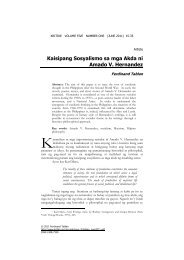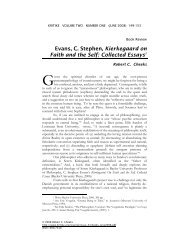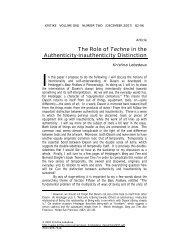The Paradox of Ipseity and Difference: Derrida's Deconstruction and ...
The Paradox of Ipseity and Difference: Derrida's Deconstruction and ...
The Paradox of Ipseity and Difference: Derrida's Deconstruction and ...
You also want an ePaper? Increase the reach of your titles
YUMPU automatically turns print PDFs into web optimized ePapers that Google loves.
R. PADA 37<br />
subjectivity that gives rise to difference, but only to the extent that one does not<br />
consider the I or the Other as a monad, or as a purely exterior 22 entity. It would<br />
help to find the words through Hegel, just as what Derrida did in his reading <strong>of</strong><br />
Levinas, 23 in order to illustrate the importance <strong>of</strong> self-consciousness as an<br />
epistemological framework in which the ontology <strong>of</strong> difference becomes<br />
established through ipseity:<br />
Self-consciousness exists in itself <strong>and</strong> for itself, in that, <strong>and</strong><br />
by the fact that it exists for another self-consciousness;<br />
that is to say, it is only by being acknowledged or<br />
“recognized.” <strong>The</strong> conception <strong>of</strong> this its unity in its<br />
duplication, <strong>of</strong> infinitude realizing itself in selfconsciousness,<br />
has many sides to it <strong>and</strong> encloses within it<br />
elements <strong>of</strong> varied significance. Thus its moments must<br />
on the one h<strong>and</strong> be strictly kept apart in detailed<br />
distinctiveness [difference], <strong>and</strong>, on the other, in this<br />
distinction must, at the same time, also be taken as not<br />
distinguished [ipseity]. 24<br />
Hegel answers the problem between ipseity <strong>and</strong> difference through a<br />
dialectic <strong>of</strong> intersubjectivity which can be deemed as the encounter between<br />
the I <strong>and</strong> the Other. It does not however, mean that the ego is shaped merely<br />
by its subjectivity, for in the beginning <strong>of</strong> a consciousness’ throwness into the<br />
world, it begins its knowledge <strong>of</strong> the self as an acknowledgment <strong>of</strong> otherness <strong>and</strong><br />
<strong>of</strong> the Other’s acknowledgment <strong>of</strong> the I-ness <strong>of</strong> the subjectivity that tries to<br />
participate with its being through an encounter. Hornedo notes this possibility <strong>of</strong><br />
dialectic interaction between the self <strong>and</strong> the Other:<br />
Having admitted the reality <strong>of</strong> dialectic interaction<br />
between the self (more vulgarly to be called the individual<br />
subject), it is not difficult historically to demonstrate how<br />
individuals create objective reality <strong>and</strong> history while at the<br />
same time being created by them through his own agency<br />
22 My use <strong>of</strong> the word exteriority connotes an internality that does not lend its<br />
immanence towards transcendence. On the contrary, Derrida might support the notion that the<br />
ego or the subjectivity is external to Others, but then to consider this as pure or as a total<br />
condition <strong>of</strong> the subjectivity would then erase the possibility <strong>of</strong> intersubjective relations. Just as in<br />
the case <strong>of</strong> Levinas, the recourse towards an ethics <strong>of</strong> pure difference leads one to conclude that the<br />
“I” <strong>and</strong> the “Other” would be totally indifferent from each other since they would not be able to<br />
even acknowledge the Otherness <strong>of</strong> one other. I will clearly object with the point that the ego is a<br />
conatus, only because its interiority is affected by its exteriority. Thus, the “Other,” despite its<br />
exteriority, is still accessible to an “I” in as much as it manifests its interiority externally, <strong>and</strong><br />
hence affects an Other interiority (which is the “Other’s” exteriority) that is also an Other.<br />
Through participation, the difference <strong>of</strong> the “I” <strong>and</strong> the “Other,” is no longer considered to be<br />
pure in so far as there is a convergence <strong>of</strong> “selves” occurring in their encounter.<br />
23 Cf. Derrida, Writing <strong>and</strong> <strong>Difference</strong>, 140.<br />
24 G.W.F Hegel, Phenomenology <strong>of</strong> Mind, trans. by J.B. Baillie (New York: Dover<br />
Publications, Inc., 2003), 104-105. [My interpolations]
















